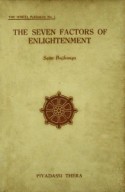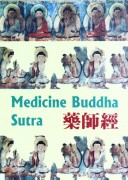Tìm Sách
Sách tiếng Anh-English >> The Seven factors of Enlightnment
Thông tin tra cứu
- Tên sách : The Seven factors of Enlightnment
- Tác giả : Salta Bojinanga
- Dịch giả : Piyadassi Thera
- Ngôn ngữ : Anh
- Số trang : 0
- Nhà xuất bản : Buddhist Publication Society
- Năm xuất bản : 1964
- Phân loại : Sách tiếng Anh-English
- MCB : 0000
- OPAC :
- Tóm tắt :
THE SEVEN FACTORS OF ENLIGHTENMENT
Salta Bojinanga by Piyadassi Thera
BUDDHIST PUBLICATION SOCIETY
THE SEVEN FACTORS OF ENLIGHTENMENT
The Tipitaka, the Buddhist canon, is replete with references to the factors of enlightenment expounded by the Enlightened line on different occasions under different circumstances. In the Book of the Kindred Sayings, V (Samyutta Nikaya, Maha Vagga) we find a special section under the title Bojjhahga Samyutta wherein the Buddha discourses on the bojjhangas in diverse ways. In this section we read a series of three discourses or sermons recited by Buddhists since the time of the Buddha as a protection (paritta or pirit) against pain, disease and adversity.
The term bojjhanga is composed of bodhi + anga. Bodh denotes enlightenment, to be exact, insight concerned with the realization of the four Noble Truths; namely: the Noble Truth of Suffering; the Noble Truth of the Origin of Suffering; the Noble Truth of the Cessation of Suffering and the Noble Truth of the Path leading to the Cessation of Suffering. Anga means factors or limbs. Bodhi + anga (bojjhanga), therefore, means the factors of enlightenment, or the factors for insight, wisdom.
“Bojjhahga! bojjhahga! is the saying, Lord. Pray, Lord, how far is this name applicable?” queried a monk of the Buddha. “Bodhaya samvattantĩti kho bhikkhu tasmá bhojjhah- ga ti vuccanti.” ‘They conduce to enlightenment, monk, that is why they are so called,’ was the succinct reply of the Master.
Further says the Buddha, “Just as, monks, in a peaked house all rafters, whatsoever go together to the peak, slope to the peak, join in the peak, and of them all the peak is reckoned chief, even so, monks, the monk who cultivates and makes much of the seven factors of wisdom, slopes to Nibbana, inclines to Nibbana, tends to Nibbana.”
The seven factors are:
- Mindfulness (sati)
- Keen investigation of the dhamma (dhammavicaya)
- Energy (viriya)
- Rapture or happiness (piti)
- Calm (passaddhi)
- Concentration (samadhi)
- Equanimity (upekkha).
One of the discourses on the Bojjhangas may be mentioned here. It begins:
“Thus I heard: At one time the Buddha was living at Rajagaha, at Veluvana, bamboo grove, in the squirrels” feeding-ground. At that time the Venerable Maha Kassapa who was living in Pipphali Cave, was sick, stricken with a severe illness.
Then the Buddha rising from His solitude at eventide visited the Venerable Maha Kassapa, took His seat, and spoke to the Venerable Maha Kassapa in this wise:
“Well, Kassapa, how is it with you? Are you bearing up; are you enduring? Do your pains lessen or increase? Are there signs of your pains lessening and not increasing?”
“No, Lord, I am not bearing up, I am not enduring. The pain is very great. There is a sign not of the pains lessening, but of their increasing.”
“Kassapa, these seven factors of enlightenment are well expounded by me, cultivated and much developed by me, and when cultivated and much developed they conduce to full realization, perfect wisdom, to Nibbana. What are the seven?
- This, O Kassapa, is well expounded by me, cultivated and much developed by me, and .when cultivated and much developed, it conduces to full realization, perfect wisdom, to Nibbana.
- Investigation of the dhamma…
- Energy…
- Rapture…
- Calm…
- Concentration…
- Equanimity, O Kassapa, is well expounded by me…
THE WHEEL
A SERIES OF BUDDHIST PUBLICATION
- The Seven Factors of Enlightenment. Piyadassi Thera.
- Vedanta and Buddhism. H. V. Glasenapp.
- Buddhism and Science. Essays.
- The Greatest Adventure (A youth booklet). Ohn Ghine.
- The Buddha. A Short Study of His life and Teaching. Piyadassi Thera
- The Four Sublime States. (Brahma-vihara). Nyanaponika Thera.
- The Practice of Lovingkindness. (Metta). Selected texts transl. by Nanamoli Thera.
- The Kalama Sutta. The Buddha’s Charter of Free Inquiry. Transl. by Soma Thera.
- Kamma and Rebirth. Nyanatiloka Thera.
- Sakka’s Quest. From the Discourses of the Buddha. (Digh. Nik- 21). Transl. by Sister Vajira.
- (Egolessness and Deliverance). Nyanaponika Thera.
- /13. The Case for Rebirth. Francis Story. (Double Number).
- Everyman’s Ethics (Sigalovada, Mangala, Parabhava, Vyaggha- pajja Suttas). Transl. by Narada Thera.
- a/b. Dependent Origination (Paticca-Samuppada). Piyadassi Thera.
16.Buddhism and Christianty. Buddhism and the Vital Problems of our Time. Prof. H. von Glasenapp.
17.Three Cardinal Discourses of the Buddha. (First Sermon; Characteristic of Not-self; Fire Sermon). Transl. by Nanamoli Thera.
- Devotion in Buddhism. Three Essays.
19.The Foundations of Mindfulness (Satipatthana Sutta). Transl. by Nyanasatta Thera.
20.The Three Signata (Anicca, Dukkha, Anatta). Prof o. H. de A. Wijesekera.
BODHI LEAVES
A SERIES OF TRACTS
- An Outline of Buddhism. Narada Thera.
- Influence of Buddhism on a People. Nyanatiloka Thera.
- Two Buddhist Parables. Nyanasatta Thera.
- Self-Mastery. Soma Thera.
- The Three Refuges. Nanamoli Thera.
- The Bhikkhu. Bhikkhu Siridhamma.
- Master’s Quest for Light. Abeyasekera.
- Buddhism and Worship. G. p. Malalasekera.
- The Buddhist Concept of Mind. o. H. de A. Vijesekera.
- A Teaching for our Time. Soma Thera.
- Buddhism and Beauty. D. Dhirasekera.
- Dhammacakkappavttana Sutta (The Wheel of Lew). Transl. by Soma Thera.
 Facebook
Facebook
 Google
Google
 Google+
Google+


















